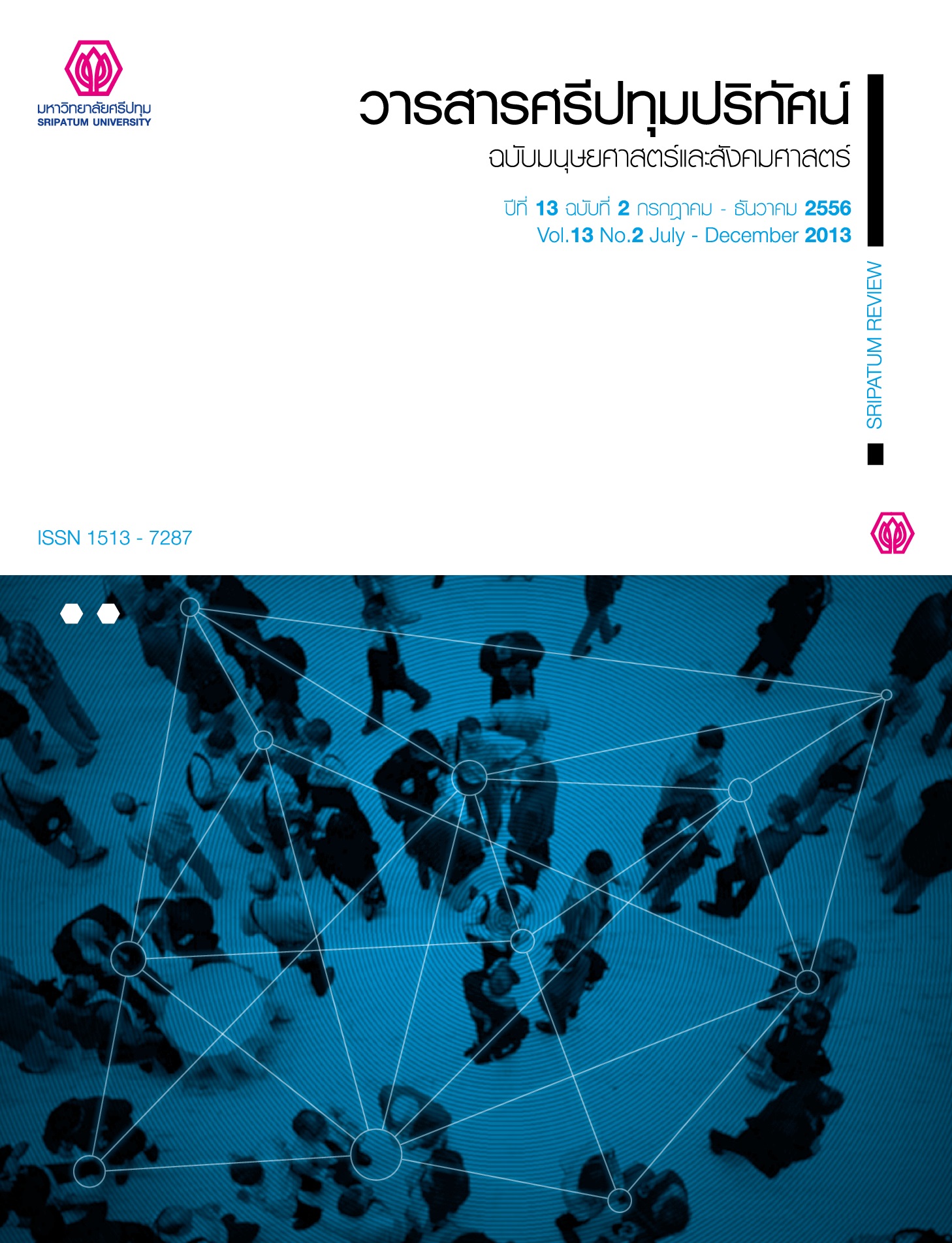THE EFFECTS OF SERVICE QUALITY OF TRAVEL BUSINESS ON THE IMPRESSION OF EUROPEAN TOURISTS IN CHIANG RAI PROVINCE
Main Article Content
Abstract
The objectives of this research were to study 1) the effects of service quality of travel business on the satisfaction of European tourists in Chiang Rai province; 2) the effects of service quality of travel business on the impression of European tourists in Chiang Rai province; and 3) the effects of the satisfaction on the impression of European tourists in Chiang Rai province. A questionnaire was employed as the research instrument to collect data from 400 European tourists in Chiang Rai province. Statistical procedures employed for data analysis were the multiple correlation analysis and multiple regression analysis.
The research findings showed that the service quality of travel business in terms of service tangibility, responsiveness to service receivers, assurance for confidence of service receivers, and empathy with clients had positive effects on the satisfaction of European tourists in Chiang Rai province at the statistically significant level of 0.05, while service reliability did not have a significant positive effect on the satisfaction of European tourists. The service quality of travel business in terms of service tangibility, service reliability, responsiveness to service receivers, and assurance for confidence of service receivers had positive effects on the impression of European tourists in Chiang Rai province at the statistically significant level of 0.05, while empathy with clients did not have a significant positive effect on the impression of European tourists. Meanwhile, the European tourists’ satisfaction also had a positive effect on their impression at the statistically significant level of 0.05. Therefore, the travel business focusing on service quality could enhance satisfaction and impression of European tourists. Consequently, the findings of this research study could be employed as guidelines for improvement and development of tourist business toward service excellence and enhancement of service efficiency in the future.
Article Details
1. กองบรรณาธิการสงวนสิทธิ์ในการพิจารณาและตัดสินการตีพิมพ์บทความในวารสาร
2. บทความทุกเรื่องจะได้รับการตรวจสอบทางวิชาการโดยผู้ทรงคุณวุฒิ แต่ข้อความและเนื้อหาในบทความที่ตีพิมพ์เป็นความรับผิดชอบของผู้เขียนแต่เพียงผู้เดียว มิใช่ความคิดเห็นและความรับผิดชอบของมหาวิทยาลัยศรีปทุม
3. การคัดลอกอ้างอิงต้องดำเนินการตามการปฏิบัติในหมู่นักวิชาการโดยทั่วไป และสอดคล้องกับกฎหมายที่เกี่ยวข้อง
References
การท่องเที่ยวแห่งประเทศไทย. 2554.
จิตตินันท์ เดชะคุปต์. 2548. เจตคติและความพึงพอใจในการบริการ เอกสารการสอนวิชาจิตวิทยาการบริการ หน่วยที่ 8-15. พิมพ์ครั้งที่ 2, กรุงเทพ : มหาวิทยาลัยสุโขทัยธรรมมาธิราช.
ปราณี เอี่ยมลออภักดี. 2548. “การตลาดบริการ: คุณภาพการบริการมุ่งเน้นความสำคัญของลูกค้า.” วารสารวิชาการ มหาวิทยาลัยหอการค้าไทย ปีที่ 25 ฉบับที่ 1: 41-51.
เพ็ญแข แสงแก้ว และคนอื่นๆ. 2539. การสำรวจค่าใช้จ่ายนักท่องเที่ยว ปี 2537.กรุงเทพฯ:มหาวิทยาลัย เกษตรศาสตร์.
ราณี อิสิชัยกุล. 2550. การจัดการทรัพยากรมนุษย์ เพื่ออุตสาหกรรมท่องเที่ยว. พิมพ์ครั้งที่ 2. กรุงเทพฯ : มหาวิทยาลัย เกษตรศาสตร์.
รัศมี สุขประเสริฐ และคณะ. 2551. “ผลกระทบของค่านิยมขององค์กรและคุณภาพการให้บริการที่มีต่อภาพลักษณ์องค์กรของธุรกิจโรงแรมในภาคตะวันออกเฉียงเหนือ”. Proceeding การประชุมวิชาการทางพฤติกรรมศาสตร์เพื่อพัฒนาบุคคลและสังคม”. ครบรอบ 53 ปี สถาบันวิจัยพฤติกรรมศาสตร์ มหาวิทยาลัยศรีนครินทร์วิโรฒ 5 สิงหาคม 2551.
วีรพงษ์ เฉลิมจิระรัตน์. วิธีทางสถิติเพื่อการพัฒนาคุณภาพ. พิมพ์ครั้งที่ 7. กรุงเทพฯ: สมาคมส่งเสริมเทคโนโลยี (ไทย-ญี่ปุ่น), 2543.
สุดาพร สุวัฒโนดม. 2545. “ความพึงพอใจของการใช้บริการที่มีต่อการบริการของโรงแรมรีสอร์ทในเขตอำเภอเมือง จังหวัดนครราชสีมา.” ภาคนิพนธ์ บธ.ม. นครราชสีมา : มหาวิทยาลัย วงษ์ชวลิตกุล.
สุรสิทธิ์ ลอย และคณะ. 2555. “ความสัมพันธ์ระหว่างกลยุทธ์การสร้างความจงรักภักดีของลูกค้ากับความสำเร็จในการดำเนินงานของธุรกิจโรงแรมในประเทศไทย.” วารสารการบัญชีและการจัดการ มหาวิทยาลัยมหาสารคาม ปีที่ 4 ฉบับที่ 1, มกราคม-มีนาคม 2555.
Bodet. 2008. “Customer Satisfaction and Loyalty in Service: Two Concepts, Four Constructs, Several Relationships”. Journal of Retailing and Consumer Service, 15: 156-162.
Gonzalez, Comesana, and Brea. 2007. “Assessing Tourist Behavioral Intentions Through Perceived Service Quality and Customer Satisfaction.” Journal of Business Research, 60: 153-160.
Hair, J. F., Black, W. C., Babin, B. J., Anderson, R. E. and Tatham, R. L. 2006. Multivariate Data Analysis. 6th Edition, New Jersey, Pearson Education International.
Nunnally, J. C. and Bernstein, I. H. 1994. Psychometric Theory, New York, NY: McGraw-Hill.
Parasuraman A., Zeithaml Valarie A., Berry Leonard L. 1988. “SERVQUAL : A Multiple-Item Scale for Measuring Consumer Perceptions of Service Quality,” Journal of Retailing, 64: 12-40.
Sansook, J. 2010. Strategic Customer Relationship Management Capabilities and Market Peformance: An Empirical Study of Private Hospitals in Thailand. Dissertation Mahasarkham University.
Sivabrovornvatana, N., Siengthai, S., Krairit, D., Paul, H., 2005. “Technology Usage, Quality Management Systems, and Service Quality in Thailand,” International Journal of Health Care Quality Assurance, 18(6/7): 413-424.
Wand, Y. and Others. 2004. An Integrated Framework for Customer Value and Customer-Relationship Management Performance: A Customer-Based Perspective from China, Managing Service Quality. 14.
Yamane, T. 1970. Statistics an introductory analysis. 3rd. New York: Harper International Edition.


